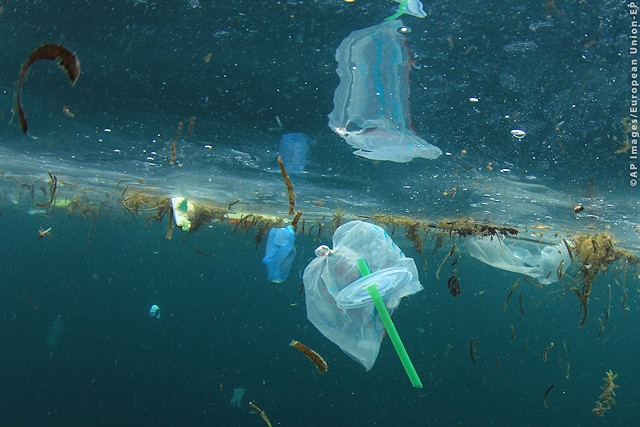Microplastic pollution widespread in British lakes and rivers, new study reveals
Date published: 08 March 2019

Photo: AP images/European Union -EP
Plastics such as these break down into microplastic pollutants (less than 5 mm in size)
Two rivers in Greater Manchester have the highest levels of microplastic pollution of some of Britain’s most iconic and remote rivers and lakes, according to new research by Bangor University and Friends of the Earth.
The study, believed to be the first of its kind, looked at ten sites – including lakes in the Lake District, waterways in the Loch Lomond and Trossachs National Park, a wetland and Welsh reservoir – and found microplastics in all of them.
Friends of the Earth and Dr Christian Dunn, of Bangor University (who led the research) say the findings suggest that microplastics should now be considered as an emergent contaminant - and that routine monitoring of all UK waters must now take place.
Friends of the Earth is also urging MPs to support new legislation, currently before Parliament, to phase out plastic pollution within 25 years – including an end to non-essential single-use plastic by 2025.
Using a fluorescence lighting system, researchers were able to identify and count microplastic pollutants (less than 5mm in size) per litre of water, such as plastic fragments, fibres and film.
The preliminary findings revealed microplastic pollution levels ranging from over 1,000 pieces of plastic per litre in the river Tame in Greater Manchester, to 2.4 pieces per litre in Loch Lomond.
The River Irwell, which flows from Bacup to Salford and has the Roch as a tributary, was found to have 84.8 pieces of plastic per litre, the second highest of the surveyed areas.

Last year, a report by Eunomia for Friends of the Earth, estimated that huge quantities of microplastic pollution are entering UK waterways from a number of sources every year. The key sources of pollution include car tyres (7,000-19,000 tonnes), clothing (150-2,900 tonnes), plastic pellets used to make plastic items (200-5,900 tonnes) and paints on buildings and road markings (1,400-3,700 tonnes).
Friends of the Earth and Dr Christian Dunn say further work is now essential to fully investigate any health risks from microplastics – to humans and ecosystems – so that “safe” levels can be ascertained, and removal and mitigation processes can be put in place.
Dr Dunn, of Bangor University, said: “It was more than a little startling to discover microplastics were present in even the most remote sites we tested, and quite depressing they were there in some of our country’s most iconic locations. I’m sure Wordsworth would not be happy to discover his beloved Ullswater in the Lake District was polluted with plastic.
“These initial findings, from our team at Bangor University with Friends of the Earth, show that we have to start taking the issue of plastic in our inland waters seriously.
“Plastic is polluting our rivers, lakes and wetlands in a similar way as pollutants such as so-called ‘emerging contaminants’ like pharmaceutical waste, personal care products and pesticides.
“As with all emerging contaminants we don’t yet fully know the dangers they present to wildlife and ecosystems, or even human health, and to what levels they occur in all our water systems.
“But it’s now clear that microplastics should be considered a serious emerging contaminant and there needs to be a concerted effort to regularly monitor all our inland waters for them.
“Our method provides a straightforward and low-cost way of doing this so we now need to roll it out and see if our preliminary results are just the tip of the iceberg.”
Julian Kirby, plastics campaigner at Friends of the Earth said: “The widespread contamination of our rivers and lakes with microplastic pollution is a major concern, and people will understandably want to know what impact this could have on their health and environment.
“Plastic pollution is everywhere - it’s been found in our rivers, our highest mountains and our deepest oceans.
“MPs must get behind new legislation, currently before Parliament, that would commit the government to drastically reduce the flow of plastic pollution that’s blighting our environment.”
Although there have been a number of studies on plastic pollution in the marine environment and some on the sediment of waterways, less research has been conducted on microplastic pollution in actual water samples from inland systems in the UK.
The methodology used in this study offers a simple low-cost way of collecting and analysing samples, allowing regular nationwide monitoring of waterways.
Do you have a story for us?
Let us know by emailing news@rochdaleonline.co.uk
All contact will be treated in confidence.
Most Viewed News Stories
- 1Rochdale born entrepreneur aims to take health platform stateside
- 2High Sheriff visits Rochdale’s Army of Kindness
- 3Numerous arrests in Rochdale retail crime crackdown
- 4Toast of the town: Mayor of Rochdale celebrates 25 years at renowned bakery company
- 5GMP reveals numbers of drink and drug drivers recorded over festive period
To contact the Rochdale Online news desk, email news@rochdaleonline.co.uk or visit our news submission page.
To get the latest news on your desktop or mobile, follow Rochdale Online on Twitter and Facebook.

